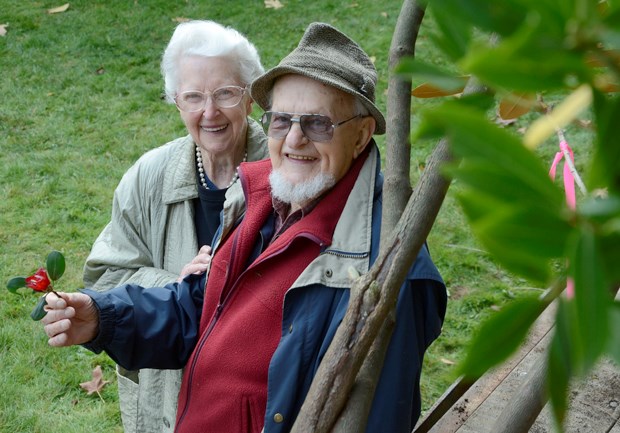To many people plants have value beyond just money, and long term preservation of unique plant collections and even entire gardens has become an emerging trend in British Columbia.
I know of several gardens on the lower West Coast that have been given to conservation organizations or municipalities as part of estate planning, Dart's hill is just one notable example of this trend. Here on the North Shore, one of the world's bestknown and knowledgeable rhododendron growers is making moves to protect and preserve his collection of rare rhododendrons for future generations.
Alleyne Cook, or "Cookie" as he is affectionately known, and his wife Barbara are in the midst of preserving their rare collection of rhodos they collected over the last 40 years. Cook has given rhodos to many local gardens and parks over his lifetime including the University of British Columbia Botanic Garden, VanDusen Botanical Garden and Stanley Park to name a few. Transplanting 56 mature rhododendrons takes a community of dedicated people to dig, wrap in burlap, transport and replant such rhodos. In this case, Cook's rhodos are destined for the Sunshine Coast Botanical Garden (coastbotanicalgarden.org).
I spoke with Mary Blockberger, operations and volunteer co-ordinator at SCBG, to ask her about Cook's rhodo donation to find out how the gift will help develop the garden. Blockberger said, "When Alleyne approached us about accepting some of his collection, we felt incredibly honoured. We know that this will be a giant leap forward in the development of the Sunshine Coast Botanical Garden, and his faith in our vision is, understandably, quite significant. We have long wanted to devote an area of our garden to a spring walk, mixing rhodos with other trees, shrubs, perennials and bulbs that provide interest year round. Alleyne's gift meant we accelerated our planning for this area, and once a suitable area had been chosen, our volunteers got down to work."
As I mentioned, it takes a community to complete a project of this size and the community included seven members from the SCBG who travelled to North Vancouver to help with the move, joined by UBC Horticulture Training Program instructor Egan Davis, the program's assistant Lee Sibbald and their students, as well as staff from the District of Sechelt and the City of North Vancouver. I contacted the UBC Botanical Garden to get their perspective on the value of this collection and the value of the training exercise for their students, but they did not return my request for comment.
I can tell you that based on my own extensive experience training students at Park & Tilford Gardens and the UBC Botanical Garden, including my past mentorship and training of Egan Davis and Lee Sibbald, field training is invaluable to students because it melds theory and practice into a field-ready "skill," which is one of the ultimate goals of teaching horticulture students.
I spoke with the lovely and charming Mrs. Barbara Cook to ask why the SCBG was chosen as the receipt of this rare collection and she told me, "Over long years, we have supplied many parks and gardens with material. For example, Stanley Park from 1966 on, also UBC, VanDusen, Tofino and others. We are donating our plants, 50 to start, in the first wave, to SCBG as they are a young and vibrant society with land and space. Our large mature plants will be valued and nurtured there." I also asked Barbara how the day's work went and she said, "When 53 people were here all at the same time, from 7:20 a.m. until 2:15 p.m., we felt a little weary! The SCBG brought trucks, crews and tables to serve all the food necessary. North Vancouver Parks provided a fork-lift and crew. Imagine hoisting those biggies (rhodos) onto a flat bed and dump trucks without it. The UBC horticulture students under the supervision of Egan Davis and Lee Sibbald worked with seamless progress. Some specimens required five people to haul on burlap sheets! And they cleaned up too."
The monetary value of Cook's collection is real and definable but it is not the point. People who love plants preserve them because plants have intrinsic and transcendent value to society and the planet, especially in an era of ongoing environmental destruction. Alleyne and Barbara Cook clearly understand those values. And so do the talented and enthusiastic members of the Sunshine Coast Botanical Garden who have worked tirelessly on a volunteer basis for the past several years to develop and grow a garden worthy of the admiration and enjoyment of future generations. As I have said before, when it comes to plants and perhaps people too, "maturity is virtue realized" and the opportunity to appreciate the virtue of Cook's rhododendron collection will now be preserved for future generations.
Todd Major is a journeyman horticulturist. [email protected]



